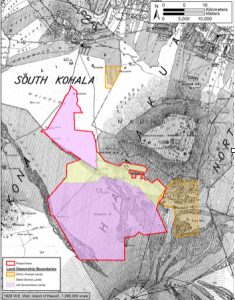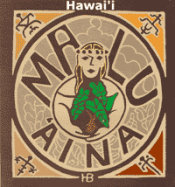Pohakuloa Cultural Impacts
 Sent: Monday, October 31, 2022 8:22 PM
Sent: Monday, October 31, 2022 8:22 PM
To: Matt Sproat <sproat@honuaconsulting.com>
Subject: Cultural Impact Assessment for the Army Training Land Retention at Pōhakuloa Training Area, Ka’ohe Mauka, Island of Hawai’i
Re: Cultural Impact Assessment for the Army Training Land Retention at Pōhakuloa Training Area, Ka’ohe Mauka, Island of Hawai’i
TMKs: 4-4-015:008; 4-4-016:005; 3-8-001:013 & 022; and 7-1-004:007
Aloha,
Earlier this year, the Department of the Army published a Draft Environmental Impact Statement (DEIS) that analyzes the environmental and cultural effects of the proposed retention of up to approximately 23,000 acres of State-owned land at Pōhakuloa Training Area. Links to the DEIS are available at:
The DEIS was prepared in accordance with National Environmental Policy Act (NEPA), Hawaiʻi Revised Statutes Chapter 343, and Hawaiʻi Administrative Rules Chapter 11-200.1. The project area is comprised of Tax Map Keys 4-4-015:008; 4-4-016:005; 3-8-001:013 & 022; and 7-1-004:007 in the ahupua’a of Ka’ohe Mauka on the Island of Hawai’i. The EIS considered three (3) action alternatives and a no action alternative. A Draft Cultural Impact Assessment (Draft CIA) was prepared as part of the DEIS.
The CIA team sought consultation with practitioners, Native Hawaiian Organizations, stakeholders, and other individuals. Specifically, consultation is sought on a) identification of an appropriate geographic extent of study, b) historic or existing cultural resources that may be impacted by the proposed project, c) historic or existing traditional practices and/or beliefs that may be impacted by the proposed project, and d) identification of individuals or organizations that should be sought out for consultation on the CIA. The CIA team continues to invite practitioners, Native Hawaiian Organizations, stakeholders, and other individuals to participate in the CIA consultation.
A survey was made available online at https://www.surveymonkey.com/r/PohakuloaCIA and this survey has remained open throughout the development of the DEIS, remains open today, and will remain open through December 31, 2022.
Articles IX and XII of the State Constitution, other state laws, and the courts of the state require government agencies to protect and preserve cultural beliefs, practices, and resources of Native Hawaiians and other ethnic groups. To assist decision makers in the protection of cultural resources, Chapter 343, Hawaii Revised Statutes (HRS) and Hawaii Administrative Rules (HAR) § 11-200 rules for the environmental impact assessment process require project proponents to assess proposed actions for their potential impacts to cultural properties, practices, and beliefs.
This process was clarified by the Act 50, Session Laws of Hawaii (SLH) 2000. Act 50 recognized the importance of protecting Native Hawaiian cultural resources and required that Environmental Assessments include the disclosure of the effects of a proposed action on the cultural practices of the community and state, and the Native Hawaiian community in particular. Specifically, the Environmental Council suggested the CIAs should include information relating to practices and beliefs of a particular cultural or ethnic group or groups. Such information may be obtained through public scoping, community meetings, ethnographic interviews, and oral histories.
The State and its agencies have an affirmative obligation to preserve and protect Native Hawaiians’ customarily and traditionally exercised rights to the extent feasible. State law further recognizes that the cultural landscapes provide living and valuable cultural resources where Native Hawaiians have and continue to exercise traditional and customary practices, including hunting, fishing, gathering, and religious practices. In Ka Pa’akai, the Hawai’i Supreme Court provided government agencies an analytical framework to ensure the protection and preservation of traditional and customary Native Hawaiian rights while reasonably accommodating competing private development interests. This is accomplished through:
- The identification of valued cultural, historical, or natural resources in the project area, including the extent to which traditional and customary Native Hawaiian rights are exercised in the project area;
- The extent to which those resources—including traditional and customary Native Hawaiian rights—will be affected or impaired by the proposed action; and
- The feasible action, if any, to be taken to reasonably protect Native Hawaiian rights if they are found to exist.
As part of the effort to comply with applicable laws, we continue to seek to interview practitioners and other stakeholders who can assist in the identification of valued cultural, historical, or natural resources in the project area, including the extent to which traditional and customary Native Hawaiian rights are exercised in the project area. We are continuing to seek to identify historic sites that may be of religious or cultural significance to practitioners, stakeholders, or Native Hawaiian Organizations (NHOs). A project area map is attached.
For the Final Cultural Impact Assessment (Final CIA), the CIA team will consider any applicable comments provided in response to the DEIS and any additional ethnographic data gathered to refine the assessment of the extent to which those resources—including traditional and customary Native Hawaiian rights—will be affected or impaired by the proposed action. We also continue to seek input on feasible action(s), if any, to be taken to reasonably protect Native Hawaiian rights if they are found to exist.
Individuals or organizations may complete the CIA survey online at https://www.surveymonkey.com/r/PohakuloaCIA before December 31, 2022 or contact the CIA team at community@honuaconsulting.com or (808) 392-1617 by December 31, 2022 to participate in an interview.
If you know of any person(s) or organization(s) we should contact regarding potential interviews, you are encouraged to email us at community@honuaconsulting.com or call us at (808) 392-1617.
If you would prefer, you are welcome to call me at (808) 294-2296 or contact me via email to set up a time to be interviewed.
We greatly appreciate your time and consideration.
Me ka ha’aha’a,
Matthew Kawaiola Sproat
Honua Consulting
| Virus-free.www.avg.com |

